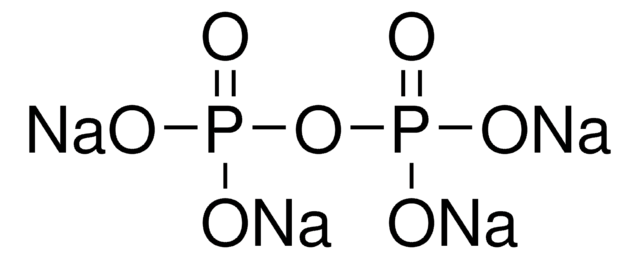S4379
Sodium phosphate glass
Type 45
Synonyme(s) :
sodium orthophosphate glass
Se connecterpour consulter vos tarifs contractuels et ceux de votre entreprise/organisme
About This Item
Produits recommandés
Vous recherchez des produits similaires ? Visite Guide de comparaison des produits
Description générale
Sodium phosphate glass is composed of Na2O–P2O5. It is used as a sequestering agent in hard water treatment and also as a dispersant in clay processing and pigment production. In Na-ion batteries, sodium phosphate glass can be used as a solid electrolyte.
Application
Sodium phosphate glass type 45 (polyP45) can be used as a reference material in the extraction and quantification of inorganic polyphosphate residues found in microorganisms.
Actions biochimiques/physiologiques
Reported to be of use in protein binding and sequestering and in studies on bone calcification.
Autres remarques
Nan+2PnO3n+1; n = the average number of phosphorus (P) atoms in the chain.
Code de la classe de stockage
13 - Non Combustible Solids
Classe de danger pour l'eau (WGK)
WGK 1
Point d'éclair (°F)
Not applicable
Point d'éclair (°C)
Not applicable
Faites votre choix parmi les versions les plus récentes :
Déjà en possession de ce produit ?
Retrouvez la documentation relative aux produits que vous avez récemment achetés dans la Bibliothèque de documents.
An improved method for extraction and quantification of polyphosphate granules from microbial cells
Mukherjee C and Ray K
Protocol Exchange, 10 (2015)
Fan Zhang et al.
Proceedings of the National Academy of Sciences of the United States of America, 112(14), 4381-4386 (2015-02-26)
Marine sponges are major habitat-forming organisms in coastal benthic communities and have an ancient origin in evolution history. Here, we report significant accumulation of polyphosphate (polyP) granules in three common sponge species of the Caribbean coral reef. The identity of
Harikiran Nistala et al.
Human molecular genetics, 29(21), 3516-3531 (2020-10-27)
Neurodevelopmental disorder with microcephaly, hypotonia and variable brain anomalies (NMIHBA) is an autosomal recessive neurodevelopmental and neurodegenerative disorder characterized by global developmental delay and severe intellectual disability. Microcephaly, progressive cortical atrophy, cerebellar hypoplasia and delayed myelination are neurological hallmarks in
Notre équipe de scientifiques dispose d'une expérience dans tous les secteurs de la recherche, notamment en sciences de la vie, science des matériaux, synthèse chimique, chromatographie, analyse et dans de nombreux autres domaines..
Contacter notre Service technique






